

Gold in faeces 'worth millions' - BBC News. US researchers are investigating ways to extract the gold and precious metals from human faeces.

The group identified gold in waste from American sewage treatment plants at levels which if found in rock could be worth mining. Details were outlined at the 249th national meeting of the American Chemical Society (ACS) in Denver. Extracting metals from the waste could also help curb the release of toxic substances into the environment. "The gold we found was at the level of a minimal mineral deposit," said co-author Dr Kathleen Smith, from the US Geological Survey (USGS). What is in My Gut? This past fall we learned about a unique study, conducted at Stanford University, designed to contribute to the understanding of the human microbiome.

This study also has a component not common to academic research — data is being returned to the participants. Intrigued, I contacted the principle investigator, Les Dethlefson, to learn more. Ernesto: Tell me about the Dynamics of Human Microbiota study. Three scientists on how the microbiome shapes our world. Inherited bugs may help weight loss. 7 November 2014Last updated at 03:45 ET Our genes influence whether we are fat or thin by shaping which types of microbes thrive in our gut, scientists say.

The discovery suggested healthy bacteria might one day be used to treat obesity, they told the journal Cell. By studying human twins, they found a type of bacteria that was not only associated with being thin but also seemed to run in families. Transplanting some of these microbes into mice slowed down weight gain. The study is the first to suggest certain types of naturally occurring gut bacteria are inherited.
Spirulina (dietary supplement) Spirulina tablets Spirulina is a cyanobacterium that can be consumed by humans and other animals and is made primarily from two species of cyanobacteria: Arthrospira platensis and Arthrospira maxima.
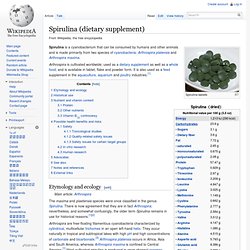
Arthrospira is cultivated worldwide; used as a dietary supplement as well as a whole food; and is available in tablet, flake and powder form. It is also used as a feed supplement in the aquaculture, aquarium and poultry industries.[1] Spirulina thives at a pH around 8.5 + , which will get more alkaline, and a temperature around 86 deg. F. Spirulina was a food source for the Aztecs and other Mesoamericans until the 16th century; the harvest from Lake Texcoco and subsequent sale as cakes were described by one of Cortés' soldiers.[6][7] The Aztecs called it "tecuitlatl".[3] Supraorbital gland. We Are Our Bacteria. Silent, not deadly; how farts cure diseases. It seems like it was only last week that a study by the University of Exeter revealed that smelling farts cures all manner of fatal illnesses, which lead to a lot of mediacoverage about the healing properties of nether-region emissions.
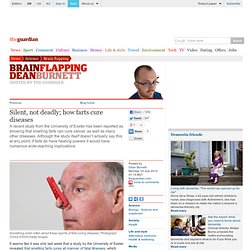
Some cynical types tried to combat this, metaphorically lifting the duvet from the growing cloud of excitement. Sure, the actual study was far more complex, and didn’t specifically reference farts, just hydrogen sulphide, a gas produced by natural bodily processes that gives flatulence its unpleasant odour. The study claimed that targeted delivery of compound called AP39 causes more hydrogen sulphide to be produced by an ailing cell, and hydrogen sulphide in small doses can prove protective to the cell’s mitochondria, which supplies the cell’s energy and is often damaged by diseases. Hydrogen sulphide preventing this mitochondrial damage therefore can help cells resist the progression of many diseases.
Medicine’s dirty secret. This is how far a mother will go.

Your daughter has been sick for more than four years with a severe autoimmune disease that has left her colon raw with bloody ulcers. After multiple doctors and drugs have failed, you are frantic for her to get better. Then you send her disease into remission, virtually overnight, with a single act of love. Ergosterol. Ergosterol is occasionally reported analytically to occur in grasses such as rye[1] and alfalfa (including alfalfa sprouts), and in plant flowers such as hops.[2] However, such detection is usually assumed to be detection of fungal growth upon (and sometimes contamination of) the plant, as fungi form an integral part of the grass decay system.
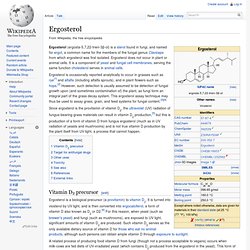
This ergosterol assay technique may thus be used to assay grass, grain, and feed systems for fungal content.[3][4] Since ergosterol is the provitamin of vitamin D2, the ultraviolet (UV) radiation of fungus-bearing grass materials can result in vitamin D2 production,[5] but this is production of a form of vitamin D from fungus ergosterol (much as in UV radiation of yeasts and mushrooms) and is not true vitamin D production by the plant itself from UV light, a process that cannot happen.
The Gut Microbiome Influences Whether Or Not You're Fat. Every time you have a meal, you’re eating not just for yourself, but for the hundred trillion bacteria that line your large intestine.
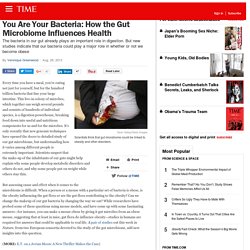
This live-in colony of microbes, which together can weigh several pounds and consists of hundreds of individual species, is a digestion powerhouse, breaking food down into useful and nutritious components for us and for the microbes. Do Your Gut Bacteria Influence Your Metabolism? Copyright © 2013 NPR.
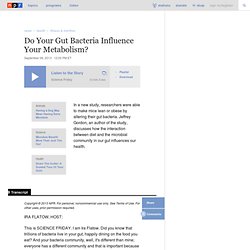
For personal, noncommercial use only. See Terms of Use. For other uses, prior permission required. This is SCIENCE FRIDAY. I am Ira Flatow. Jeffrey Gordon is a microbiologist and director of the Center of Genome Science and Systems Biology at the Washington University School of Medicine in St. Gut Bacteria Might Guide The Workings Of Our Minds : Shots - Health News. Illustration by Benjamin Arthur for NPR Could the microbes that inhabit our guts help explain that old idea of "gut feelings?
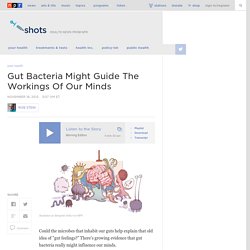
" There's growing evidence that gut bacteria really might influence our minds. "I'm always by profession a skeptic," says Dr. Emeran Mayer, a professor of medicine and psychiatry at the University of California, Los Angeles. Could obesity be cured by injecting our guts with fecal bacteria from ancient mummies?
It sounds outrageous, but King Tut's stomach bacteria might hold the cure for obesity. Researchers have recently discovered that modern use of antibiotics has wreaked havoc on the health and content of our gut bacteria. In turn, these changes have altered how our metabolisms work, possibly making us more prone to getting fat. Now scientists from the University of Oklahoma have proposed an unexpected solution: Why not replenish our gut flora using fecal bacteria from ancient mummies as a guide? Since ancient mummies lived in an era before antibiotics, it's worth a look to see how their intestinal bacteria differed from modern gut flora, to discover what has changed.
For the study, researchers not only performed DNA analysis on samples collected from the intestines of mummies found in North and South America, but they also hunted for preserved feces left in ancient cave soil, reports NineMSN. Gut Microbes and the Infant Brain: A Surprising Symbiosis. By Micah Manary The ancient genes versus environment argument (i.e., nature versus nurture) about the development of the infant human brain has taken a swerve in a direction few thought possible. A recent paper by investigators from Sweden and Singapore reports on studies using a mouse model to demonstrate that the presence of the gut microbiota significantly influences the developing brain, influencing developmental pathways that affect both motor control and anxiety-related behaviors.
The implications for human development are certainly not yet realized, but could be profound. Our anxiety, motor control, and even cognitive pathways are implicated in this paper. 11 Surprising Facts About the Digestive System.